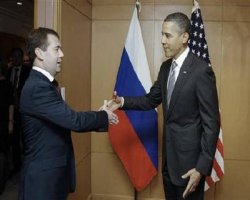Russia's parliamentary speaker has said that the Strategic Arms Reduction Treaty (START) with the US could be ratified in the country within days.
The statement from Boris Gryzlov comes a day after the US senate approved the nuclear arms-reduction deal, in what was seen as a major foreign-policy victory for Barack Obama, the US president.
Gryzlov said that as long as "the conditions attached to the resolution do not affect the text of the agreement", the treaty could be ratified as early as Friday.
Dmitry Medvedev, Russia's president, welcomed the US decision to ratify the treaty, which was voted in 71-26 on Wednesday.
He "expressed hope that the Duma and Federation Council will be ready to examine this issue and also ratify the document", Natalya Timakova, his spokeswoman, said. But she said that the government first needed to analyze the senate's decision before following suit.
Obama and Medvedev discussed the treaty by phone on Thursday, the White House said in a statement. Medvedev was said to have congratulated Obama on the passing of the bill by the Senate.
Both houses of the Russian parliament will have to ratify the pact before it can enter into force.
The Kremlin-backed United Russia party dominates both houses of parliament, meaning approval requires the support of Medvedev and Vladimir Putin, the prime minister.
The treaty, which replaces an expired accord, aims to rein in Russian and US nuclear arsenals by capping nuclear weapons and re-starting inspections.
In ratifying the treaty, 13 Republicans broke with their top two leaders and joined 56 members of the president's Democratic Party and two independents in providing the necessary two-thirds vote.
'Vital for security'
Speaking at the White House after the vote, Obama said the treaty was vital for America's national security.
"This is the most significant arms control agreement in nearly two decades. It will make us safer and reduce our nuclear arsenals along with Russia," he said.
"This treaty will enhance our leadership to stop the spread of nuclear weapons and seek the peace of a world without them."
The accord will reduce long-range, strategic atomic weapons deployed by each country to no more than 1,550 within seven years. Deployed missile launchers - whether silos, submarines or bombers - would be cut to no more than 700.
Obama had lobbied senators by phone to ratify the treaty before January, when five additional Republicans take their elected seats in the Senate, which would further endanger the support of the pact.
In talks with Republicans, Obama had committed to spend $85bn over 10 years to modernize US nuclear weapons and infrastructure.
Earlier, Medvedev also cautioned that if US and NATO offers of co-operation on missile defense failed to produce plans that satisfied Russia, relations could sour fast and Moscow could deploy weapons to combat a perceived threat.
"If we do not find our place in this system - and this will be clear in the next three to five, maybe seven years - future generations of Russian and American politicians will have to take very unpleasant decisions," he said.
Russian officials have said they will have a close look at the US senate's resolution of ratification before endorsing the treaty themselves.
PHOTO CAPTION
U.S. President Barack Obama (R) meets Russia's President Dmitry Medvedev at the APEC Summit in Yokohama November 14, 2010.
Al-Jazeera


 Home
Home Discover Islam
Discover Islam Quran Recitations
Quran Recitations Lectures
Lectures
 Fatwa
Fatwa Articles
Articles Fiqh
Fiqh E-Books
E-Books Boys & Girls
Boys & Girls  Ramadan
Ramadan Fatwa Audios
Fatwa Audios Month of Mercy
Month of Mercy Women
Women Eed Al- Fitr
Eed Al- Fitr Food Recipes
Food Recipes Videos
Videos

 Prayer Times
Prayer Times












